Let’s start with a disclaimer. Reviewers have had a short time to gather their thoughts on Mass Effect: Legendary Edition. I sacrificed all sorts of sleep to deliver this piece as swiftly as possible, but as it stands, I’ve “only” beaten the first game, made it midway through the second, and just shy of midway through the third. I know the original games inside and out, though. Barring a bug that blows up my house at the end of one of the sequels, I can safely say I have a good feel for what’s changed, what’s stayed the same, and whether or not Legendary Edition is worth the investment. We’ll update this article as soon as I’ve finished ME2 and ME3 with any additional details.
Growing up, space was always my final frontier. I stayed up late on weeknights to catch reruns of Star Trek: Voyager. I recreated Star Wars scenes with a modest but impressive collection of action figures just because I could. I devoured the works of Asimov, Heinlein, and their contemporaries. It’s safe to say that outside of video games, space dominated my childhood.
When Mass Effect first graced Xbox 360s and PCs back in 2007, I was 20 years old and had more or less given up on experiencing the sort of role-playing space epic my younger self had so desired. Ignorantly, I wrongly assumed it was some space-based shooter with minimal story. Fate is fickle and sometimes kind — a neighbor pressed me to check it out soon thereafter, and I joined the legion of fans charting the course of the famous Commander Shepard across a compelling, emotionally tumultuous trilogy of terrific BioWare RPGs.
With Mass Effect: Legendary Edition, many of you are returning to the incredible crew of the starship Normandy after years away, just like me. Others missed the boat the first time around or simply aren’t old enough to have hopped aboard during the trilogy’s original 2007-2012 run. While I imagine a fair few reviewers will choose to center on the former group — the folks who wish to know if Legendary Edition is worth the 2021 double dip — I’m going to attempt to include newcomers as well.
We spend a lot of time at RPGFan discussing delicious JRPGs. Consequently, I would guess that many of our readers are here primarily for those games. Today, I would like to make the case that JRPG enthusiasts who have never touched Mass Effect due to its distinctly Western aesthetic ought to remedy that posthaste. Simultaneously, I am glad to report that Mass Effect: Legendary Edition is a successful remaster that’s well worth its price tag.
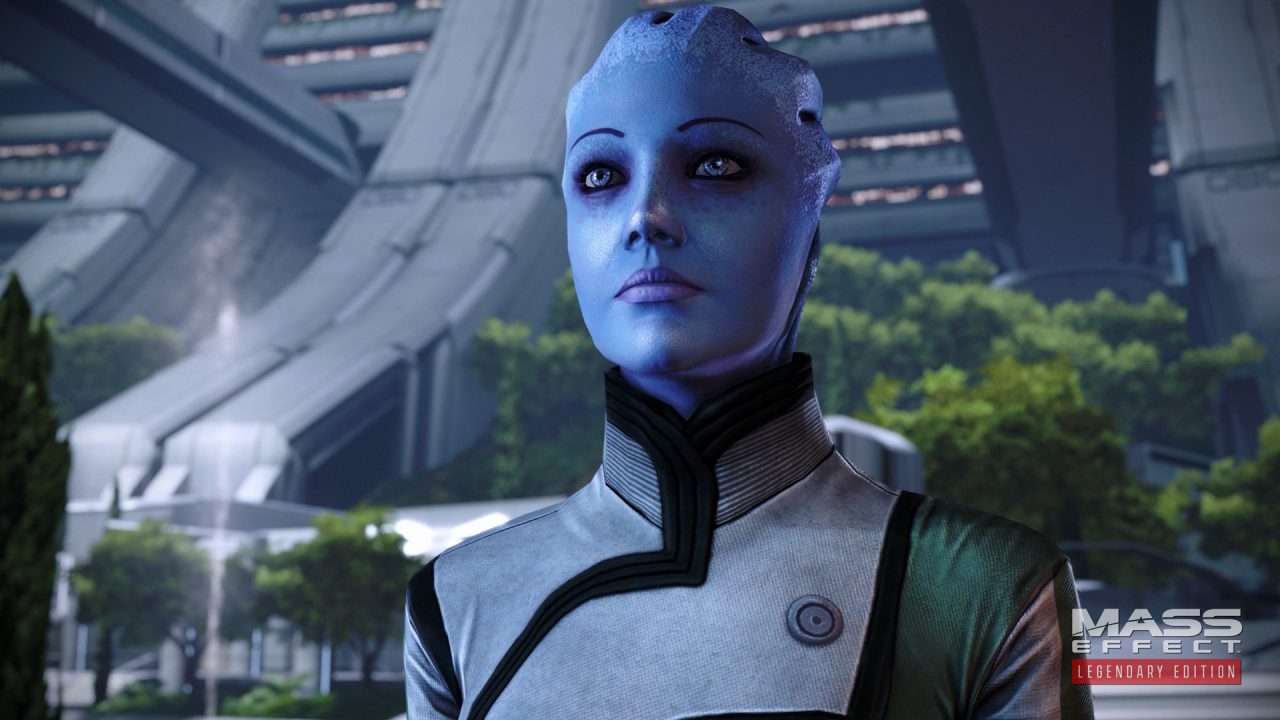
In the year 2183, humanity has joined several other space-faring species in relative peace. On the fringes, there are slavers, warlords, and thugs of every race, but the closer you are to the Citadel — the high-tech heart of known space — the less likely you are to get roughed up and marooned.
We’re the new kids on the block. Young, scrappy, and hungry. Our political and military leaders want us to be taken more seriously by the rest of the sentient denizens of the Milky Way. To that end, a promising young woman or man (you choose) named Shepard is elected humanity’s first SPECTRE candidate. SPECTREs are the galaxy’s morally grey and occasionally Machiavellian special agents, tasked with keeping the peace even if certain otherwise-barred lines must be crossed. This is a hot chance for humanity.
Shepard is either a war hero, an icon of ruthlessness, or the sole survivor of a mission gone south — again, your choice. Maybe they embody the virtues of decency and diplomacy. Perhaps they’re as renegade as they come. Or perhaps they toe that invisible line in the sand, adjusting their moral compass as the situation demands. You guessed it: it’s up to you, as are the vast majority of Shepard’s lines of dialogue, which can often recontextualize entire conversations and occasionally dictate the fates of other characters or even whole worlds. Your relationships with your crew will rely almost entirely upon how you treat them. It’s not galactically far removed from Persona.
Shepard’s mission soon becomes clear: they have the unenviable task of proving the existence of an unfathomably ancient race of eldritch machine gods and then uniting a disparate galaxy to prevent subsequent genocide. Along the way, you shut down crime syndicates, put a stop to the machinations of mad science, and proclaim no fewer than three stores your very favorite of them all.
Your allies are diverse. Some are comical. Others are stoic. Some are shy, others fierce. One hails from a world long since lost to a violent foe, her species now traveling across the stars in a migrant fleet that thematically screams Battlestar Galactica. Another is an aging member of a race that brutally subjugated countless worlds before being inflicted with mass sterilization to subdue their warlike ambitions. Some serve alongside Shepard from the get-go as fellow members of the Starfleet-esque Systems Alliance. Others serve a clandestine organization called Cerberus that paints humanity in a starker light.
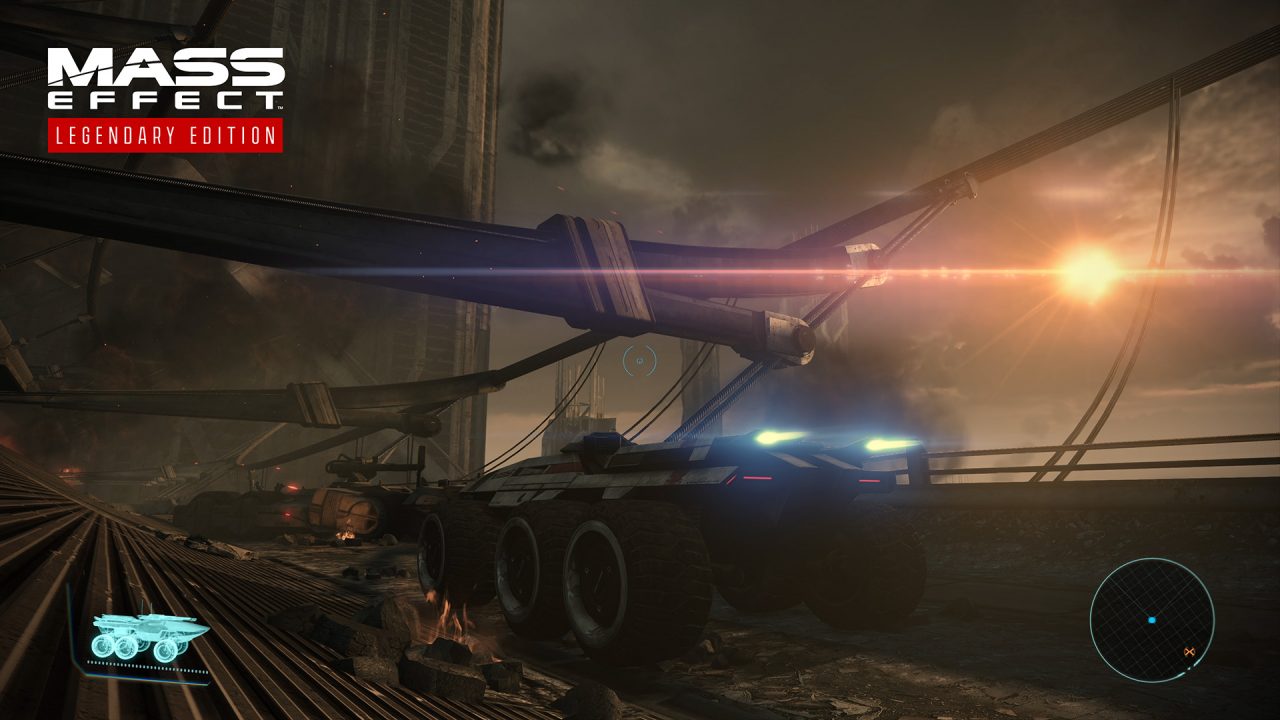
With few exceptions, each of these people will leave a lasting impression. They are smart, they are savvy, and they are individuals. They have discernible arcs and they grow in spectacular ways. To drive home the JRPG similarities, in a Final Fantasy, a Dragon Quest, a Tales or Trails, these are the long-standing party members you come to love. They just happen to be in space. And penned by Canadian writers.
They also look better than ever, thanks to an impressive graphical upgrade that has seemingly left no stone unturned. Facial design is a night-and-day difference between the original games and Legendary Edition, especially among the central characters. Cerberus specialist Miranda Lawson in particular always left me with a strange sense of Uncanny Valley, with lighting issues that never quite clicked. Now she’ll be happy to know her new look is in every fashion superior. (BioWare has also significantly toned down some of the more gratuitous “fan service” camera angles regarding Miranda, which frankly means I have an easier time taking her writing seriously.)
Most of Mass Effect’s fan favorites are aliens. Take the brooding yet virtuous and charmingly awkward Garrus Vakarian. If you’ve spent five minutes conversing with Mass Effect diehards on the internet, you have seen at least one person proclaim their love for him. Here, his otherworldliness is prettier than ever; every texture on his glorious turian frame is more vibrant. I’m not going to lie; I think I could finally melt in those vaguely bird-like eyes myself.
Of course, my heart belongs to helmet-wearing Tali’Zorah, the very best completely faceless RPG character. But I digress.
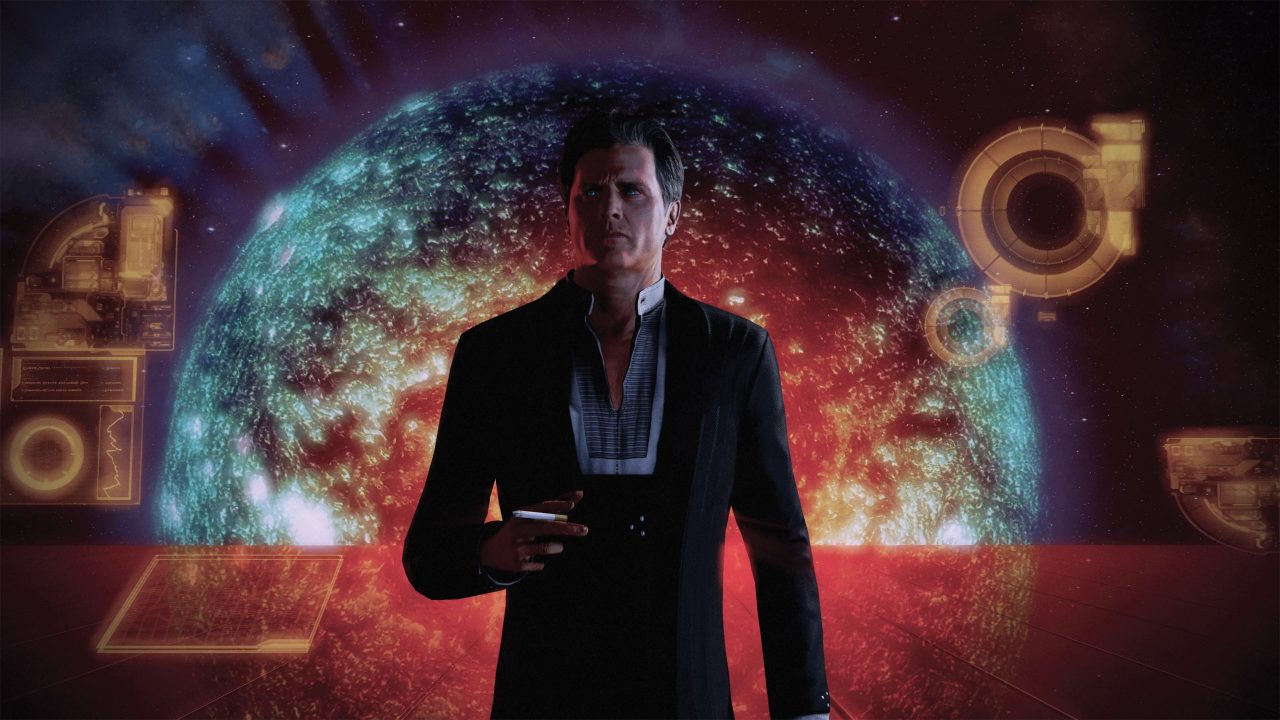
When the first Mass Effect released, it was justifiably lambasted for some less-than-stellar gameplay despite its high narrative marks. Most critics recommended the game, albeit with the disclaimer that it was clear this was BioWare’s inaugural effort at gunplay… and also that someone up in Edmonton’s studio headquarters once had a rocky affair with an armored vehicle and desperately needed to share their pain. Let me explain: the Mako is like a Mars Rover by way of Colonial Marine Tanks. It’s what happens when the Mars Rover can kill your enemies. Unfortunately, its flimsy control scheme and profound sluggishness have long infuriated some players.
With another game on the horizon, it stands to reason that BioWare would want to bring as many newcomers to this fourteen-year franchise as possible. That means more than just remastering the trilogy; it means putting their best foot forward and then stomping preconceptions with it. While older fans like myself may recall Mass Effect being a chore at times, here the developers have burned the midnight oil to deliver gameplay that’s largely on par with the sequels.
Combat is snappier. Targeting reticles actually work. A few abilities have even been revamped for better balance between classes. And while there’s no getting past the fact that many of the game’s rooms throughout your adventures in planetary exploration are copy-pasted Xbox 360 environments, now you at least have a better sense for where to take cover as you go. As for the Mako? There’s a legacy option included that will allow you to relive the existential nightmare of failing to climb a mountain for half an hour, but the rest of us will be glad to know there’s an entirely revamped control scheme that makes roaming the stars in a turret-mounted sci-fi Humvee the bucket-list dream it should have been.
With so much put into making ME1 a more modern experience, it’s easy to wonder what the team did to improve Mass Effect 2 and Mass Effect 3 beyond the (considerable) graphical boosts. The short answer is not a lot. These two games already demonstrated in 2010 and 2012 that BioWare had gained a keener grasp of battle mechanics, including diversifying the traits between classes such that a Vanguard truly felt like a vanguard, an Infiltrator like an infiltrator, and so on. Ammo pickups in the second game are more generous now after a decade’s worth of scattered complaints that they were sometimes too few and far between. The third game’s “Galactic Readiness” system — think, “if the evil Reapers were all lined up in front of me today, how screwed would I be?” — has been revamped to feel more forgiving. This happened in part due to the exclusion of Mass Effect 3’s multiplayer mode, a surprisingly detailed sideshow that I can’t say ever really clicked for me, but I know it clicked for plenty of other players. My sincere condolences if you’re only just now learning that it isn’t a part of this package. Bummer.
On the more technical end, I confess I’m hardly an expert. Sites like Digital Foundry and Ars Technica can probably tell you far more than I can. But I can at least alleviate certain concerns. To begin with, I’ve suffered exactly zero crashes during my time with Legendary Edition. The only time I’ve bumped into a glitch, or at least the only time I’ve noticed, was when stalwart squadmate Kaidan Alenko’s head did a quick 360-degree twist while we were under heavy fire in an enemy compound on a gorgeous little world called Amaranthine. In Kaidan’s defense, it was a stressful time.
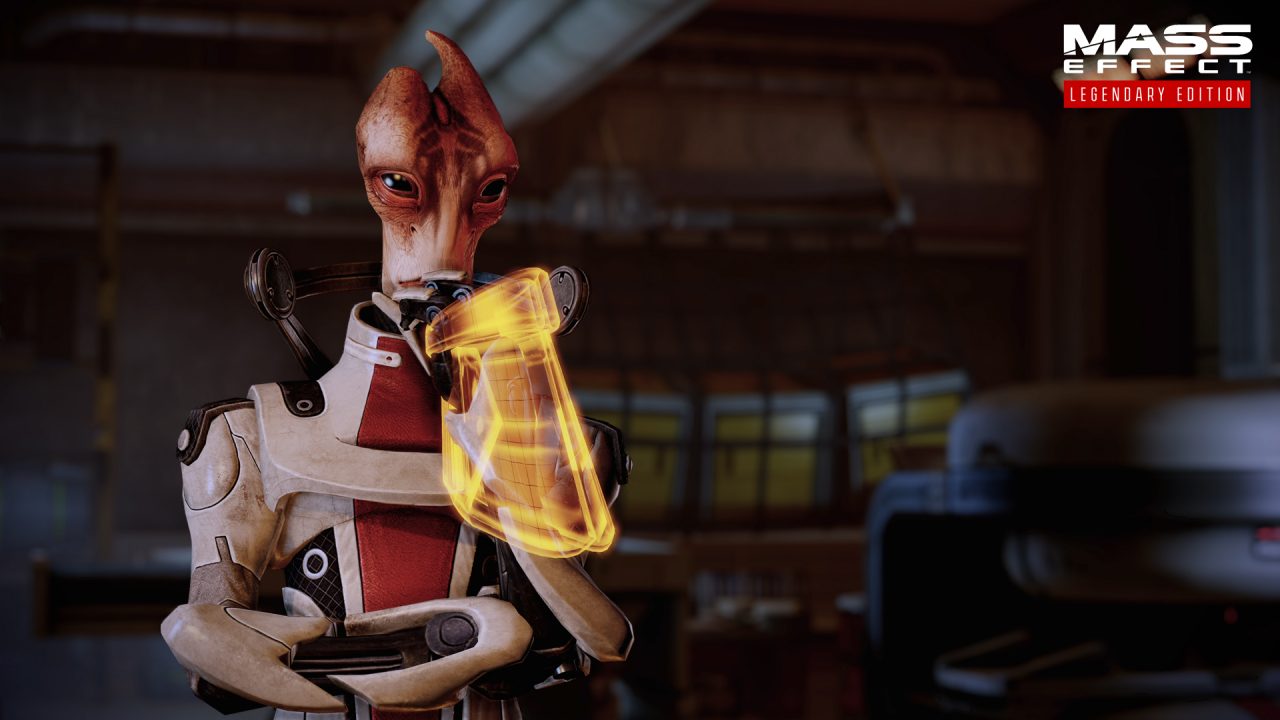
Load times are ridiculous in the best possible way. Those of you just now considering signing up for membership with the Mass Effect fandom may be interested to know that a bulk of the banter between characters in the first game was confined to elevator sequences because those elevators masked some seriously rough loading. It was a clever way to get around something far less than ideal. The banter’s still there for your amusement in Legendary Edition, but you’re given the option to reach your destination by the time the characters speak a few words. This is par for the course all over the cosmos, with blink-and-miss load times no matter where you’re headed, but it’s never funnier to behold than in those conspicuously common elevators.
There’s a realism to reflections upon the water on the Citadel and abroad that I’m quite sure was never the case until now, as well as a far finer job at anti-aliasing and a smooth frame rate that never let me down. I’m sure those who played the games on state-of-the-art PCs have always been right at home with great frame rates, but for a console lad like me, it’s an improvement worth writing home about. Last but by no means least, I’ve found that the colors pop in all three games in fresh ways, lending a more vivid streak to memorable planets like Noveria.
The sound design remains largely untouched, with a newfound crispness courtesy of better tech. This is just fine, as the trilogy’s soundtracks are uniformly superb as-is. I’ve had ME1’s ending theme stuck inside my head since the day I met it, and I can’t even say I want it gone.
If there is one aspect of Legendary Edition that drags it back down to the limitations of earth’s gravity, it’s that cutscene cinematography has not been upgraded. Don’t get me wrong. When the developers knew they needed to pour the budget into a sequence, they didn’t hold back. But the majority of scenes contain at least a few awkwardly stilted moments. It’s the small price paid for so much voiced dialogue, the so-called “talking heads” shtick that BioWare has often employed ever since. It’s worth mentioning here because, more than once, I found myself blinking and double-taking at the disparity between current-gen character models and dead-eyed stares. It’s like when Paramount and CBS gave Star Trek: The Next Generation the HD treatment. You’re not supposed to see Brent Spiner’s pores, but here we are.
But this is the style of asterisk we all knew was coming. It’s what happens when beloved games have an excellent remaster rather than full-blown (and doubtless prohibitively expensive) remakes on brand new engines. You’re going to notice sometimes that these games are not new. They’re shinier, they’re snappier, and almost every DLC in trilogy history is faithfully stitched into the framework. But now and then, Commander Shepard’s eyes are going to roll inexplicably sideways, just as they did back in the day.
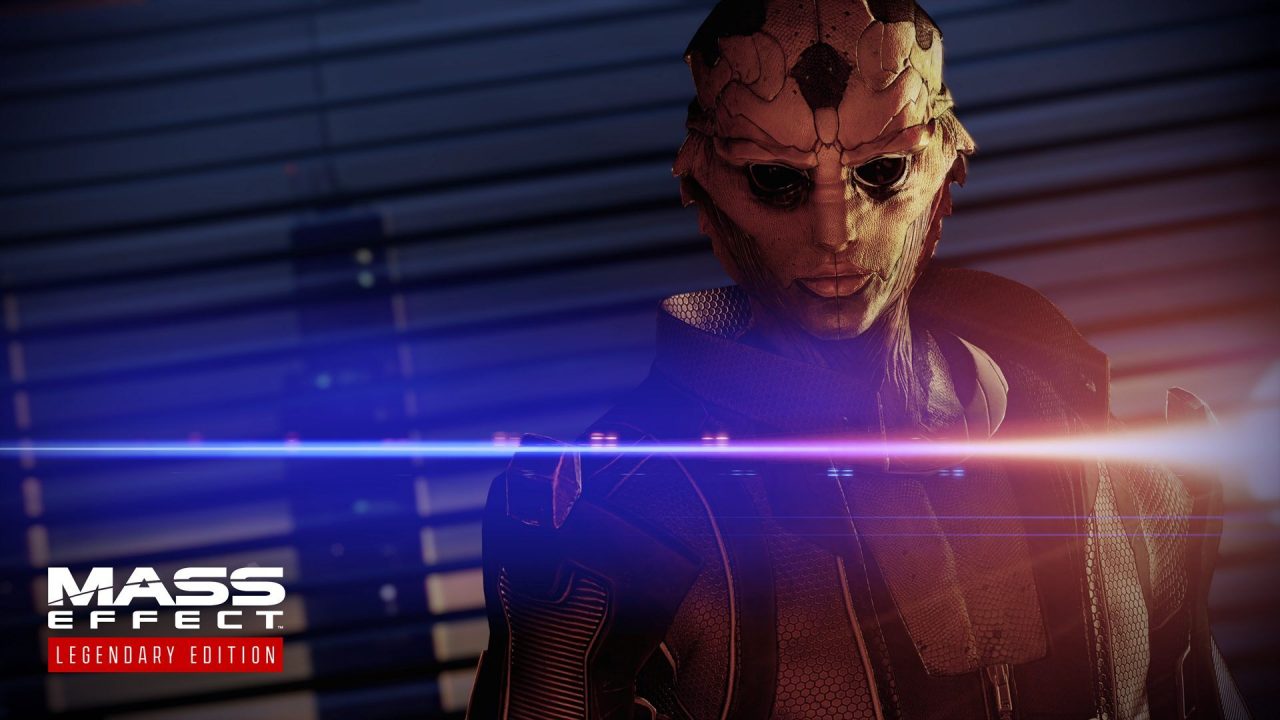
Mass Effect: Legendary Edition is just about everything I had hoped it would be. It carries the torch from past into future, dutifully imbuing Shepard’s fantastical voyages with a sense of modernity that will help the series continue to attract new fans as we inch boldly closer to whatever comes next. It doesn’t reinvent the wheel because that’s not what it sets out to do, but it does improve the first game to a considerable degree. It takes care to transfer the largely-unchanged sequels into a new decade of gaming.
Returning SPECTREs will have the same good time, with bells and whistles to accentuate it all. Prospective players, even those whose RPG interests are of the decidedly Japanese variety, will be hard-pressed to find a better sixty-dollar buy in 2021.



